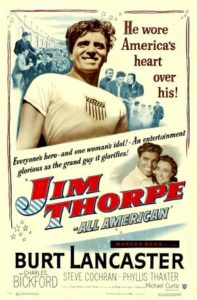Jim Thorpe -All American (1951)
Warner Bros.
Director: Michael Curtiz
Main Cast: Burt Lancaster, Charles Bickford, Jim Thorpe
On the one hand, this film admirably portrays the life of a native american. On the other hand, it is highly problematic. There are some decent acting performances, but the score is tedious Hollywood pap. The script is the biggest problem. First of all, it is not very historically accurate, sacrificing facts to develop melodramatic plot points. But the worst thing about it is that the story is designed to emphasize personal failings to diminish the nagging problem of racism. Now, the film does address racism. But it is brought up mainly as a “strawman” to be knocked down in favor of a formulaic personal struggle narrative arc. It presents Thorpe’s life as one of him being too emotionally weak to succeed (in the face of racism, personal tragedies). To draw an analogy, this is premised on the Louis Armstrong or Sammy Davis, Jr. model — a great individual can overcome all institutional and social obstacles (racism) just by being personally talented enough in ways that are non-threatening to social power structures. This is essentially a parallel of the “Talented Tenth” theory of W.E.B. Du Bois (later disavowed) and the questionable advocacy of Booker T. Washington. In other words, without any irony, Thorpe is merely expected to have a superhuman willpower and resolve to overcome discrimination. The real-life Jim Thorpe was subject to a level of discrimination well beyond anything depicted in the film, and the film would have been much better if it addressed that (and had a better score). For that matter, one would hardly realize from the film that its timeline runs through the Great Depression. Anyway, fortunately in the coming years there were other, sounder ways of looking at these sorts of questions gaining traction (see Frantz Fanon, Paulo Freire, etc.).

